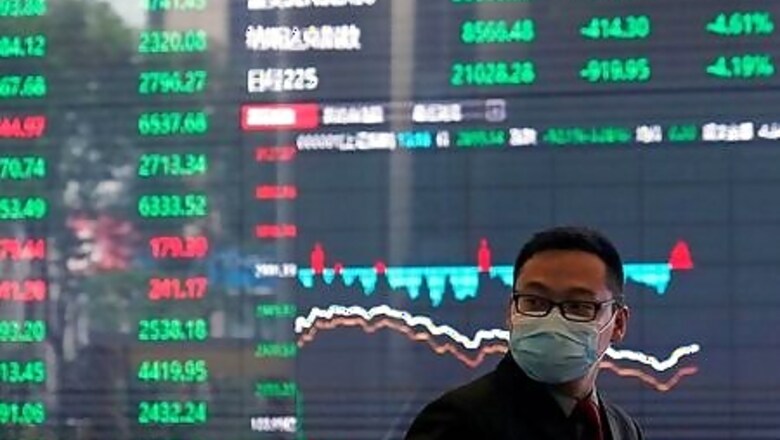
views
MILAN/TOKYO: World shares struggled to stabilise on Tuesday as doubts about a recovery in tech stocks lingered after last week’s rout, while the dollar steadied as investors pondered whether policy signals from the European Central Bank this week could weaken the euro.
Fresh tensions between Washington and Beijing after U.S. President Donald Trump again raised the idea of decoupling the U.S. and Chinese economies appeared to have little impact.
“I think the market will shrug this off as electioneering but may find the lining up of technology stock sellers harder to process as the U.S. market returns from a holiday yesterday,” said Chris Bailey, European Strategist at Raymond James.
World shares fell 0.1% by 0835 GMT following gains in Asia overnight and a negative start in Europe, where fresh pressure on tech stocks dragged the STOXX 600 benchmark down 0.9% following strong gains on Monday.
After U.S. markets were shut on Monday for Labor Day, S&P 500 futures fell 0.1%, reversing gains made in Asian hours, while futures in tech-heavy Nasdaq fell 1.3% after having lost more than 6% late last week.
While many market players were unable to pinpoint a single trigger for the Nasdaq’s sudden plunge, valuations have been stretched given its sharp 75% gain from a bottom hit in March.
MSCI’s broadest index of Asia-Pacific shares outside Japan rose 0.4% and Japan’s Nikkei ended up 0.8%. China’s blue-chip index and Hong Kong’s Hang Seng meanwhile gained 0.5% and 0.2% respectively, both erasing early losses made after Trump’s remarks.
The newly launched Hang Seng tech index fell 1.4%.
Trump’s remarks followed the possible U.S. blacklisting of China’s largest chip maker, Semiconductor Manufacturing International Corp (SMIC), which has hit many Chinese tech firms listed onshore and offshore.
DOLLAR STEADY, POUND HIT
In foreign exchange markets, the dollar was slightly stronger against a basket of currencies at 93.115 and firmed marginally against the euro at $1.1816 with the main focus on this week’s ECB policy meeting.
Most analysts do not expect a change in the central bank’s policy stance but are looking at its inflation forecasts and whether it seems concerned by the euro’s strength.
“Rangebound trading will likely remain predominant until Thursday when the ECB meets,” UniCredit analysts said in a note.
Sterling fell to a two-week low against the dollar after the European Union told Britain on Monday there would be no trade deal if London tries to override the Brexit divorce deal it signed in January.
The pound slipped more 0.3% at $1.3135 while against the euro it touched 0.90 pence, also a two-week low.
Gold prices softened on Tuesday, although rising doubts over the economic recovery from the COVID-19 slump limited losses. Spot gold was little changed at $1,9283.87 per ounce.
Oil fell below $42 a barrel, its fifth session of decline, pressured by concerns that a recovery in demand could weaken as coronavirus infections flare up around the world.
U.S. crude futures fell 3.3% to $38.46 per barrel.
The 10-year U.S. Treasury yield stood at 0.709%, off a five-month low of 0.504% touched in August.
(Additional reporting by Julie Zhu in HONG KONG; Editing by Catherine Evans)
Disclaimer: This post has been auto-published from an agency feed without any modifications to the text and has not been reviewed by an editor




















Comments
0 comment